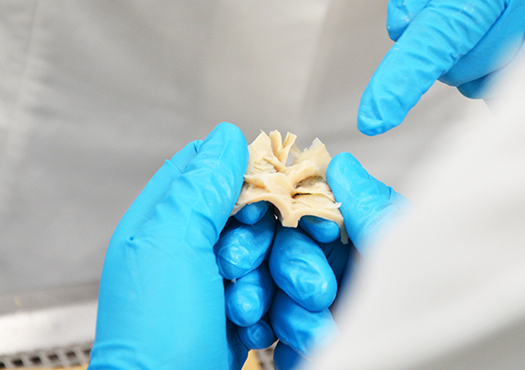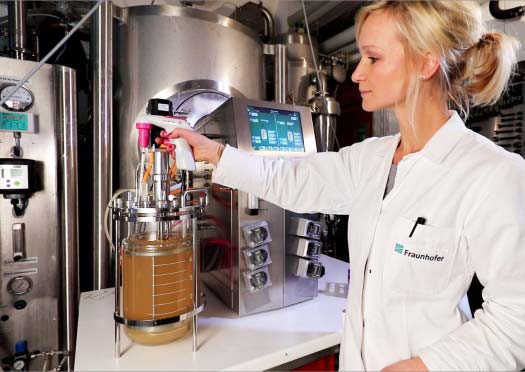
Food development

Customized foods
We develop customized foods and functional ingredients to meet your requirements. We assist you in all development phases, namely from the product idea, model formulations, process concept, and sample production to scale-up of the manufacturing process for industrial quantities of market-ready products. Our expertise in the development of foods and food ingredients as well as in the area of packaging, instrumental analysis, and sensory analytics enable us to provide you with a comprehensive range of services along the entire production chain.
Take advantage of our well-equipped food pilot plant for your sample production and quality analyses!
Manufacturing processes for food – Research



Our research focuses on the interactions between formulations, processes, and product properties. A particularly important area of work is the development of methods for texturing plant-based foods via fermentation and extrusion. Another key area is the replacement of animal-based ingredients (e.g. egg protein and milk protein) by plant-based ingredients. The development of product-specific in-vitro methods such as bile acid binding and salt liberation allow us to improve the nutritive profiles of foods. We have many years of experience processing chocolate and analyzing all relevant materials, from the starting cocoa beans to finished pralines. In all our development work the organoleptic properties of products are a priority.
Extrusion technology for food production
We research the crosslinking reactions of proteins, the modification of thermo-physical and physio-chemical properties of materials under high shear and temperature conditions, and the quantification of textural characteristics. For example, we control the protein structure in the end product via the water content of an extrudate and the temperature control. Based on experience working with a variety of legumes we are able to understand the interplay between raw material properties, processing behavior, and textural properties. This allows us to develop new strategies for the production of textured proteins and sustainably produced animal feeds. Our advanced technical facilities with three twin-screw extruders enable us to work on a laboratory scale (1 kg/h) right up to a small pilot plant scale (ca. 80 kg/h).
Fermentation processes to improve nutritional properties
Plant raw materials often contain flavor components and antinutritive substances that limit their use in foods. We develop processes to remove these substances via fermentation and simultaneously improve the nutritive, technofunctional, and especially sensory properties of the raw materials. Leguminous plants, that typically have bean-like and bitter flavors, can for example be processed in such a way that they can be used in vegan foods. A key area of research is the development of plant-based alternatives to dairy products. We use fermentation processes to generate specific product textures. The plant proteins are networked in such a way that it is possible to manufacture both plant-based yoghurt and cheese. In addition, we can customize the fermentation to produce specific taste and flavor characteristics, for example acidity and freshness to the palate. We carry out this work on a scale from 500 ml to 20 l.
Further information on the production of plant-based dairy alternatives
360° Tour - Fermentation pilot plant
Hold down the mouse button and use the mouse pointer to move 360° virtually through our pilot plant!
Double click for full screen mode.
360° Tour - Extrusion pilot plant
Hold down the mouse button and use the mouse pointer to move 360° virtually through our pilot plant!
Double click for full screen mode.
 Fraunhofer Institute for Process Engineering and Packaging IVV
Fraunhofer Institute for Process Engineering and Packaging IVV